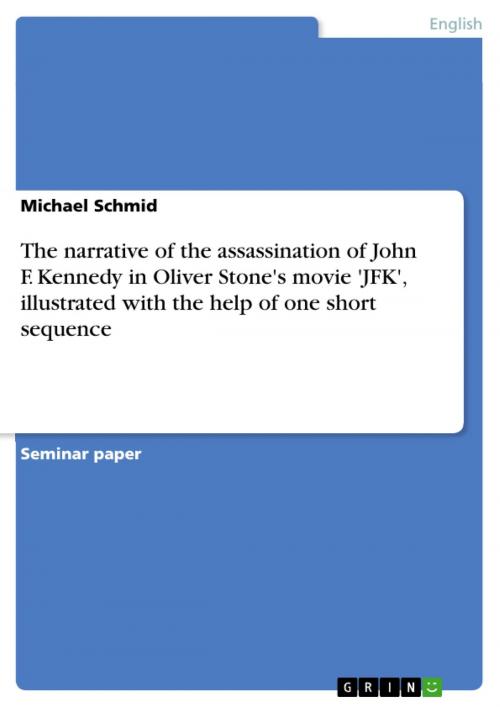The narrative of the assassination of John F. Kennedy in Oliver Stone's movie 'JFK', illustrated with the help of one short sequence
Nonfiction, Entertainment, Drama, Anthologies| Author: | Michael Schmid | ISBN: | 9783638590792 |
| Publisher: | GRIN Publishing | Publication: | January 12, 2007 |
| Imprint: | GRIN Publishing | Language: | English |
| Author: | Michael Schmid |
| ISBN: | 9783638590792 |
| Publisher: | GRIN Publishing |
| Publication: | January 12, 2007 |
| Imprint: | GRIN Publishing |
| Language: | English |
Seminar paper from the year 2004 in the subject American Studies - Culture and Applied Geography, grade: 1,7, Free University of Berlin (John F. Kennedy Institut Berlin), course: HS American Cultural Memory: Trauma, Collective Imagery and the Politics of Remembering, 5 entries in the bibliography, language: English, abstract: Not many topics have produced more material than the subject of John F. Kennedy and his tragic death in November 1963. The more publications have occurred and keep occurring, the more it seems that narratives and explanations are multiplying and differing. John F. Kennedy is not only being remembered by the political world or his friends and family, he has become a symbol of youth, progress and reform which is being remembered by all kinds of people and all parts of society. Kennedy is being portrayed in popular culture such as movies, music, pop art and photography. His face is reoccurring constantly in the history books and in modern art. This text focuses on the cultural narrative of John F. Kennedy and his assassination in the movie 'JFK' (directed by Oliver Stone in 1991). I am aware that there are multiple ways of approaching the subject of JFK and especially that John F. Kennedy means different things to different people. I will not try to cover all possible narratives involving JFK and the assassination but I will explain that the movie 'JFK' had a specific agenda and a certain narrative which was portrayed very explicitly to the audience. When John F. Kennedy was assassinated, Oliver Stone was a teenager and thought of the killing of the president as a turning point in American modern history. After he had read Jim Garrison's novel 'On the trail of the Assassins' (1988) in which Garrison, the district attorney of New Orleans at the time of JFK's death, described his research concerning the death of JFK, he decided to make a movie out of Garrison's story. His decision to direct 'JFK' paid off not only because the movie stimulated a heated debate over the remaining documents involving the death of JFK which are being withheld by the government up to the present, but also because Stone created a stunning movie which earned him a Golden Globe. The movie 'JFK' shows the district attorney of New Orleans Jim Garrison making it his personal agenda to find out the truth regarding the assassination of president Kennedy. He soon becomes convinced that there was more to it than the official evaluation by the government and the 'Warren Commission' which concluded that Lee Harvey Oswald had been the lone assassin of the president. Garrison becomes dedicated to his cause of revealing the plot, the conspiracy which killed JFK and proving that the lone assassin theory is simply a cover up by government authorities to conceal their involvement in the plot.
Seminar paper from the year 2004 in the subject American Studies - Culture and Applied Geography, grade: 1,7, Free University of Berlin (John F. Kennedy Institut Berlin), course: HS American Cultural Memory: Trauma, Collective Imagery and the Politics of Remembering, 5 entries in the bibliography, language: English, abstract: Not many topics have produced more material than the subject of John F. Kennedy and his tragic death in November 1963. The more publications have occurred and keep occurring, the more it seems that narratives and explanations are multiplying and differing. John F. Kennedy is not only being remembered by the political world or his friends and family, he has become a symbol of youth, progress and reform which is being remembered by all kinds of people and all parts of society. Kennedy is being portrayed in popular culture such as movies, music, pop art and photography. His face is reoccurring constantly in the history books and in modern art. This text focuses on the cultural narrative of John F. Kennedy and his assassination in the movie 'JFK' (directed by Oliver Stone in 1991). I am aware that there are multiple ways of approaching the subject of JFK and especially that John F. Kennedy means different things to different people. I will not try to cover all possible narratives involving JFK and the assassination but I will explain that the movie 'JFK' had a specific agenda and a certain narrative which was portrayed very explicitly to the audience. When John F. Kennedy was assassinated, Oliver Stone was a teenager and thought of the killing of the president as a turning point in American modern history. After he had read Jim Garrison's novel 'On the trail of the Assassins' (1988) in which Garrison, the district attorney of New Orleans at the time of JFK's death, described his research concerning the death of JFK, he decided to make a movie out of Garrison's story. His decision to direct 'JFK' paid off not only because the movie stimulated a heated debate over the remaining documents involving the death of JFK which are being withheld by the government up to the present, but also because Stone created a stunning movie which earned him a Golden Globe. The movie 'JFK' shows the district attorney of New Orleans Jim Garrison making it his personal agenda to find out the truth regarding the assassination of president Kennedy. He soon becomes convinced that there was more to it than the official evaluation by the government and the 'Warren Commission' which concluded that Lee Harvey Oswald had been the lone assassin of the president. Garrison becomes dedicated to his cause of revealing the plot, the conspiracy which killed JFK and proving that the lone assassin theory is simply a cover up by government authorities to conceal their involvement in the plot.















